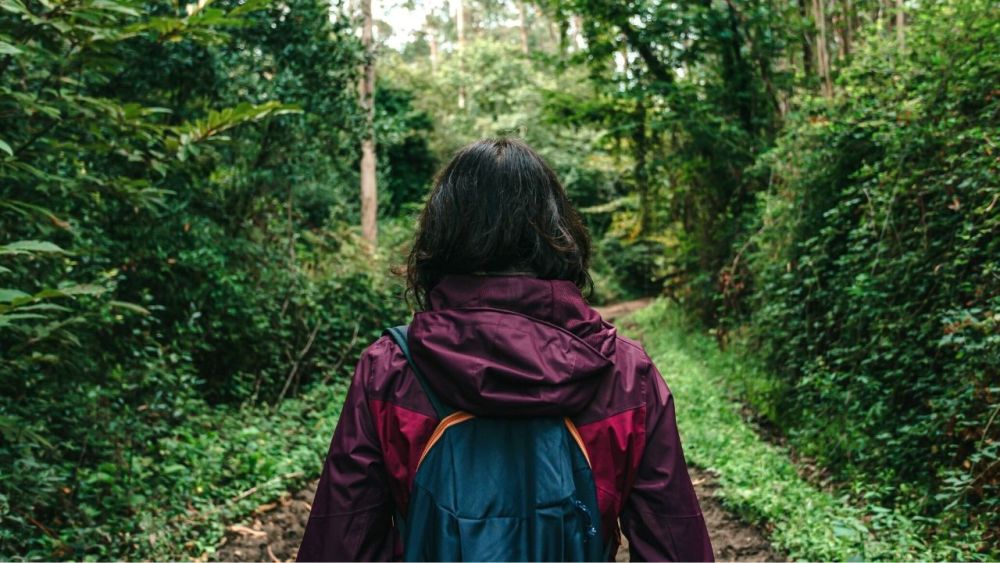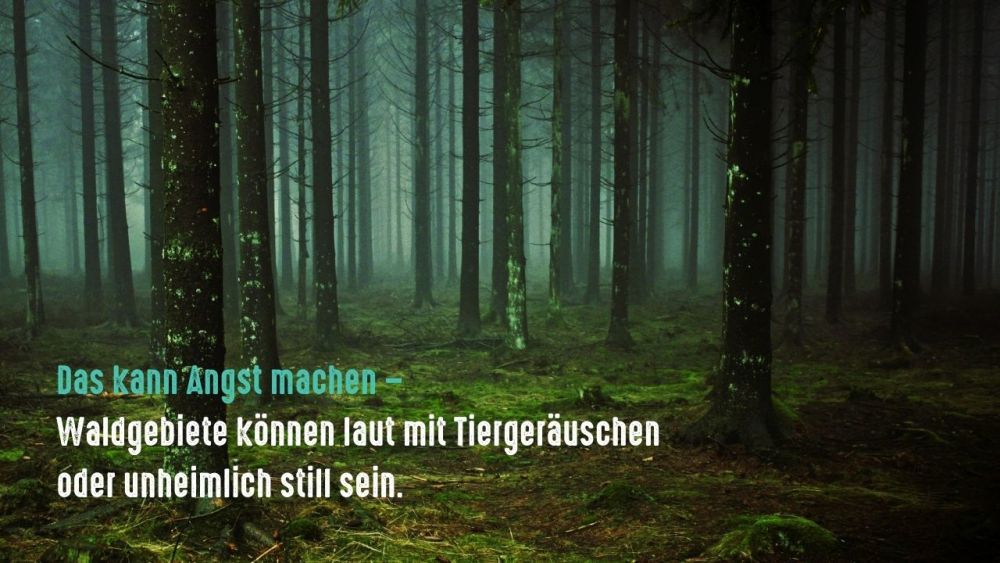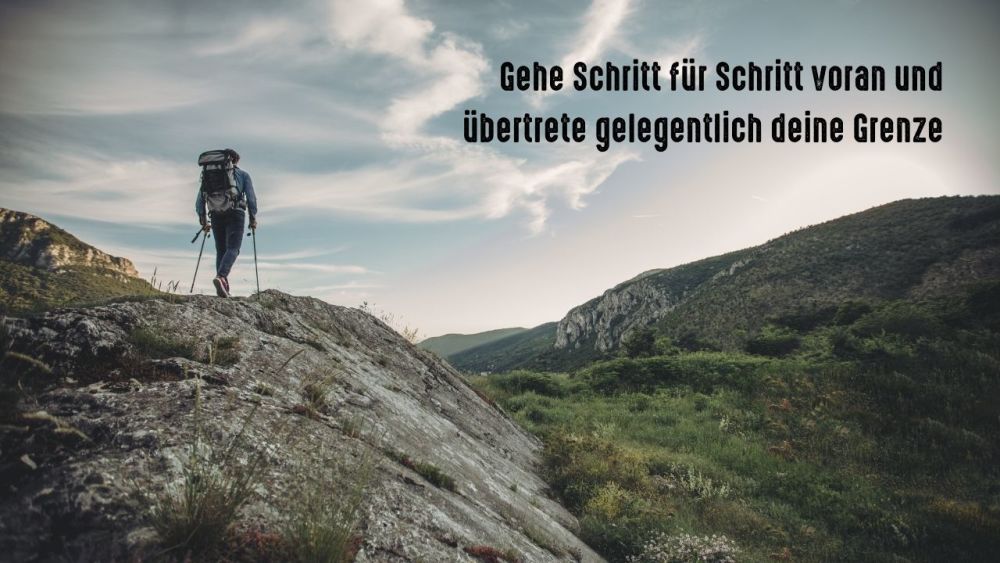
How do I lose my fear of the forest and wilderness (+exercise)
👉 The key facts from this guide
- Fear often arises from the unknown and loss of control. If you feel insecure in the forest, try to make something known out of the unknown by informing and preparing yourself.
- Most people are afraid of unknown noises, getting lost, dangerous insects, falling branches, and other possible dangers in the forest.
- It is important to recognize these fears and deal with them.
- To overcome your fears, take it step by step and occasionally push your limits. Learn about the dangers in the forest and how to protect yourself.
- Prepare yourself for your stay in the forest. Learn about the area, get to know the plants and animals, plan a route, and create an emergency plan.
- Maintain a positive and motivated attitude. Tell yourself "I can do this" and "I am strong enough". Reward yourself for achieving a goal.
- Remember that the forest and wilderness are much safer than the city. There are some dangers, but they can be easily mitigated if you are aware of them.
Time and time again, I receive emails from readers saying that they are actually at an entirely different point.
These people are just starting out, they want to leave the forest paths, but they don't dare to.
They feel anxious when they hear an unknown sound in the forest or when a stick cracks in the undergrowth.
I can understand that very well. If I hadn't grown up near the forest and hadn't gotten to know it through my family, I'm sure I would feel the same way.
Unfortunately, the forest is always associated with the "deep and dark" forest, where nasty animals live and ticks lurk everywhere. But it's the opposite, and I invite you to convince yourself of that.
In this guide, I will address fears and uncertainties, give you methods and perhaps alleviate the fear a bit.
Let's get started.
What causes fear?
Humans have always had and still have to deal with fears. Animals are no different.
What do animals and humans do when they are afraid? They almost always flee the situation or avoid it.
The hare is terribly afraid when the wolf chases after it. That is completely understandable, as it is a matter of its life.

We humans are no different. We run away when we think we could be harmed. Our gut feeling tells us that something could harm our health or injure us.
These feelings and intuitions are completely normal and even important.
Please let me say this: You are not alone with this feeling, and it is not abnormal.
A situation that cannot be controlled causes fear. And everyone reacts differently. Some run away, some freeze, some attack.
Imagine if our ancestors thousands of years ago hadn't been afraid? The saber-toothed tiger would have eaten them every time. Humanity wouldn't exist today.
So, fear is nothing bad at first.
But there are no saber-toothed tigers in our forests anymore.
Fear arises from the unknown, from the loss of control
Of course, you could now say that there are other dangers than the saber-toothed tiger that could harm your health.
I'm with you on that. For example, there are still dangerous animals in Germany. You shouldn't underestimate wild boars.
But do you know how people who work a lot with wild boars or have plenty of contact with them behave?
They are no longer afraid of the animals, but - and this is important - they have a healthy respect for the animals. They no longer feel insecure, but know exactly how to handle the animals.
That's a big difference.
The fear of going into the forest is the uncertainty about the unknown, about the loss of control in an event.

If you don't know who's making the noises, don't know which animal is dangerous and don't know any methods to protect yourself - yes, then fear comes into play.
As an example, I find the knife wonderful here too.
There are people who don't like to carve because they are afraid of injuring themselves.
And you know what? Everyone who started carving once had that fear.
And not without reason, because a knife is not only an incredible tool for working with wood, but also a weapon that can be life-threatening.
Do you know the methods of handling a knife and do you acquire the skills, your fear will diminish (you can learn it, for example, in my course). Even quite the opposite: you will learn to appreciate what you can accomplish with this great tool.
What can I do about fear in the woods? Turn the unknown into the known
There is a great way if you want to move forward.
You have to deal with the fears of going into the forest.
I promise you: if you know your fears and inform yourself about the topic, then your fear will diminish.
The unknown becomes familiar.

With familiar things, you feel safer, and you know how to control them.
And you will see that some fairy tales are just fairy tales and some myths are still haunting people.
It is terrible how much superstition and nonsense is still being passed on in our enlightened time.
What are most people afraid of in the woods?
I would like to distinguish here between rational and irrational fears.
Because an irrational fear is a phobia. There is also one called "xylophobia". Xylophobia is the fear of wood and wooden objects. In this anxiety disorder, the xylophobic avoids everything that contains wood (forests, wooden furniture, etc.) and smells like wood.
If you are convinced that you suffer from xylophobia, it is best to speak to a therapist.
Rational fears
Most people have rational fears of the forest due to real or perceived dangers.
People with certain illnesses may be concerned about not being able to contact a rescuer if they are alone while hiking and become sick or injured.
Those who feel vulnerable, like some women and children, may worry about being attacked by a person.
Those who live in areas known for attacks by bears or other animals may be concerned about coming into contact with a dangerous animal.
By definition, a phobia is an irrational fear. If your fear is based on realistic concerns, it is not a phobia.
Consider seeking professional help for a more severe phobia.
Creepy People
Another fear that I often hear when I attend camps or talk to my grandma: murderers, robbers, and crazy people in the woods.
My grandma: "Aren't there weird people in the woods?"
Me: "Maybe, but there are far fewer than in the city."
Apparently, my grandma has watched many movies where a murderer lurks in the woods and attacks other people.
But the reality is that it is extremely unlikely that you will be hurt by someone in the woods compared to elsewhere.

It is actually very unlikely that you will meet anyone off the trails. And if you do, they will be people like you, exploring nature.
There are few statistics on this, but one that I find quite interesting can be found on the FBI website. It states that the likelihood of becoming a victim of a violent crime in wilderness areas is 0.0003%.
So, it is more than 3000 times more likely that you will be harmed by a person outside designated wilderness areas.
3000 times!
So if you are afraid of people, you should go into the woods.
Animal Phobias
Although in some areas it is normal to worry about animal attacks, people with animal phobias typically have an excessive level of fear that is not proportional to the situation.
Furthermore, some people fear forest inhabitants that are not very dangerous to humans, such as snakes or spiders. Animal phobias often exacerbate the fear of the forest, and in some cases are even the reason for the aversion.
Fear of the Dark
Some cases of xylophobia stem from a fear of the dark.
Heavily wooded areas are relatively dark all day long, and tall trees cast shadows on paths and clearings.
Like animal phobias, fear of the dark can worsen an existing fear of the forest or even be the main cause of this fear.
Fear of the Unknown
For some people, fear of the forest is based on a fear of the unknown.
Our society offers few opportunities to return to nature.
As a result, people who have always lived in urban areas may not be well accustomed to forest areas.
Unusual sights, sounds, smells, and textures tend to throw us unbalanced and make us suspicious.
Forest areas can be loud with animal noises or eerily silent.

Wild plants often look very different from indoor plants.
Even walking through grass, mud, or dirt feels very different from walking on an asphalt road or sidewalk. This affects people with a fear of the unknown even more.
Use your common sense
There are dangers in the forest, that should be clear to you. But all these dangers can be looked at more closely, and you can learn things about them.
The process ideally goes like this, using ticks as an example:
- You are afraid of ticks, so you don't go into the forest.
- That's understandable, since ticks can be dangerous.
- But you still want to go into the forest.
- What do you do now?
- You educate yourself about ticks and how dangerous they really are.
- You research what protective measures are available.
- Your fears diminish somewhat, as you know how to protect your health or how to control the tick situation.
Of course, going through this process will not eliminate your fears. That would be great, but it's rather wishful thinking.
But what has happened is that you've taken small steps to confront your fears, to enter the forest.
And these small steps give you confidence and self-assurance.
This psychological medicine is incredibly important for us humans so that we feel good and are secure within ourselves.
Take step by step and occasionally exceed your limits
Let's say you don't like to leave the paths in the forest.
You're afraid of strange noises, getting lost, dangerous insects, falling branches, wild hunters, spraining your foot and so on.
The list of dangers in the forest is long. Refer to the link where I've listed all the dangers of what can happen to you in the forest and how to PROTECT yourself.
But how do you go into the forest and leave the paths?
It's the small steps and your limits that you need to know.

First, it's best to inform yourself about all the dangers in the forest.
Then write down your fears and do some research on them.
The next crucial step is to locate your fears and emotions, and then make a conscious decision to face the fear directly.
So, you go out and now comes the steps that I recommend and encourage you to take (but you have to take them yourself).
Now that you're outside, you need to push your limits.
I'm not saying you should exceed them excessively. That would be unhealthy and very stressful for you.
Take a step beyond your limit.
Stop.
That's enough.
You can be proud of yourself.
You've gone further than you have in the past. That's great.
And with each small step beyond your limits, you (hopefully) gain good experiences.
I can't promise you'll always have good experiences, but it will mostly be that way.
Prepare for your stay in the forest
If you have a relatively mild fear, you can use your knowledge and exposure to combat it.
- Inform yourself in advance about the area in which you will be hiking or camping.
- Get to know common plants and animals (more about wild boar, wolf, and tick here).
- Plan a route, carry a good map with you (there are also many reliable GPS devices for hiking) and learn how to navigate.
- Create an emergency plan and always inform someone where you will be going and when you will return.
I think another good pro-tip is to try your trip with a group or with a partner instead of going alone.
Stay positive and motivated
I know that's often easier said than done. Nevertheless, it's an important point.
You should maintain your positive attitude on every trip in the forest. It's crucial because there will always be difficult moments in life.
Tell yourself "I can do this" and "I am strong enough".

Hiking in a forest or kayaking through a river requires effort.
Even though nature is breathtakingly beautiful, there may be periods of exhaustion. Rest then, be patient with yourself, and reward yourself for achieving a goal.
Final words on fear in the forest
The combination of personal fears and possible negative associations of going into the wilderness could create a complete blockade of your adventurous spirit.
That would be a shame, however, since the forest is incredibly significant to us humans, as we are also beings of nature. There we can find peace, relax, and organize our thoughts.
Furthermore, the forest and wilderness are much safer than the city.
There are a few dangers to consider when entering the forest, but these can be easily mitigated by becoming aware of them.
And don't forget: In the forest and wilderness, nature is full of insights, knowledge, and puzzles waiting for you. Once you open this wonderful book, there is no end.
For this reason, I recommend my free Survival Basics Course that you'll receive by email. The knowledge from the course will help you gain more self-confidence.
Now, what are you afraid of in the forest?


Author of the guide
Martin Gebhardt
Hey, I'm Martin. On my blog, you will learn the basics and numerous details about living in the wild. I think survival, bushcraft and the good life in nature are the keys to happiness. Find me here on Instagram or on YouTube. You can find more about my mission on the About Me page.
Was this guide helpful?
21 people found this guide helpful.
4.82 out of 5 points (22 Ratings)
Comments (0)
This post may contain affiliate links. So if you click on the links and make a purchase, I will receive a small commission at no additional cost to you. Click here, to learn more about it.


